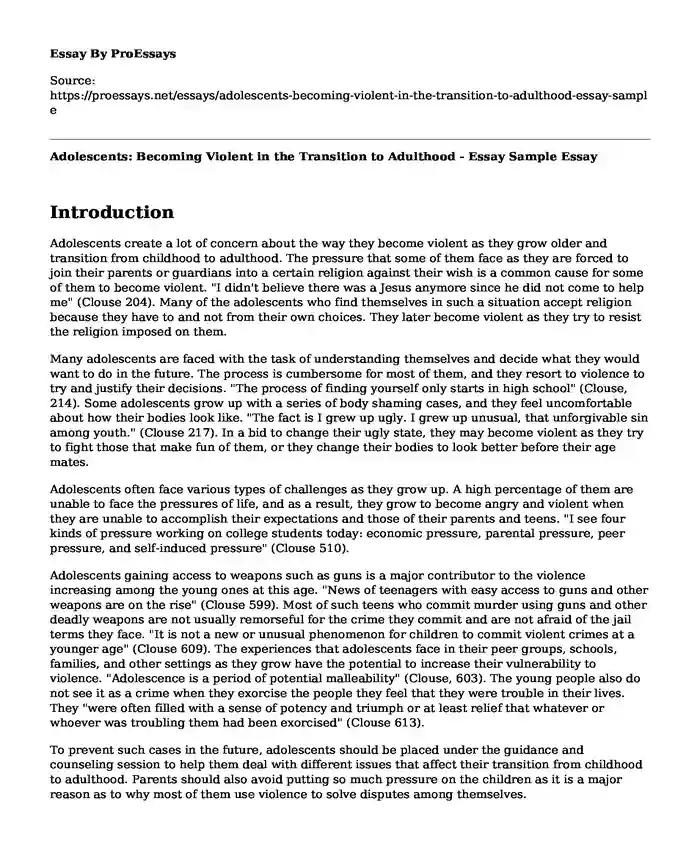Introduction
Adolescents create a lot of concern about the way they become violent as they grow older and transition from childhood to adulthood. The pressure that some of them face as they are forced to join their parents or guardians into a certain religion against their wish is a common cause for some of them to become violent. "I didn't believe there was a Jesus anymore since he did not come to help me" (Clouse 204). Many of the adolescents who find themselves in such a situation accept religion because they have to and not from their own choices. They later become violent as they try to resist the religion imposed on them.
Many adolescents are faced with the task of understanding themselves and decide what they would want to do in the future. The process is cumbersome for most of them, and they resort to violence to try and justify their decisions. "The process of finding yourself only starts in high school" (Clouse, 214). Some adolescents grow up with a series of body shaming cases, and they feel uncomfortable about how their bodies look like. "The fact is I grew up ugly. I grew up unusual, that unforgivable sin among youth." (Clouse 217). In a bid to change their ugly state, they may become violent as they try to fight those that make fun of them, or they change their bodies to look better before their age mates.
Adolescents often face various types of challenges as they grow up. A high percentage of them are unable to face the pressures of life, and as a result, they grow to become angry and violent when they are unable to accomplish their expectations and those of their parents and teens. "I see four kinds of pressure working on college students today: economic pressure, parental pressure, peer pressure, and self-induced pressure" (Clouse 510).
Adolescents gaining access to weapons such as guns is a major contributor to the violence increasing among the young ones at this age. "News of teenagers with easy access to guns and other weapons are on the rise" (Clouse 599). Most of such teens who commit murder using guns and other deadly weapons are not usually remorseful for the crime they commit and are not afraid of the jail terms they face. "It is not a new or unusual phenomenon for children to commit violent crimes at a younger age" (Clouse 609). The experiences that adolescents face in their peer groups, schools, families, and other settings as they grow have the potential to increase their vulnerability to violence. "Adolescence is a period of potential malleability" (Clouse, 603). The young people also do not see it as a crime when they exorcise the people they feel that they were trouble in their lives. They "were often filled with a sense of potency and triumph or at least relief that whatever or whoever was troubling them had been exorcised" (Clouse 613).
To prevent such cases in the future, adolescents should be placed under the guidance and counseling session to help them deal with different issues that affect their transition from childhood to adulthood. Parents should also avoid putting so much pressure on the children as it is a major reason as to why most of them use violence to solve disputes among themselves.
Works Cited
Clouse, Barbara. "Patterns for a Purpose 6th Edition." McGraw-Hill Publishing Company, 2011.
Cite this page
Adolescents: Becoming Violent in the Transition to Adulthood - Essay Sample. (2023, Jun 22). Retrieved from https://proessays.net/essays/adolescents-becoming-violent-in-the-transition-to-adulthood-essay-sample
If you are the original author of this essay and no longer wish to have it published on the ProEssays website, please click below to request its removal:
- Paper Example on Thematic Concerns Featured During Malcolm's Time in The United States
- Articles Analysis Essay on Child Abuse and Juvenile Delinquency
- Communication Studies Essay Example
- Paper Example on Mental Illness in Young Adults: Addressing Health Disparities
- Black Lives Matter: A Universal Movement for Justice - Essay Sample
- Purchase of a Stolen Good - Free Essay Example
- Disease Model of Addiction - Free Essay Example







